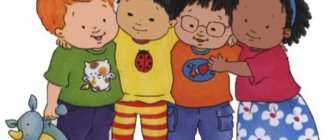Preparatory group. Senior preschool age. Children 6-7 years old
Summary of the quest game for children 5–6 years old “In Search of Emotions” Goal: to improve ideas about various emotional states in children 4–5 years old. Objectives: to systematize children’s ideas about basic emotions (joy, sadness, surprise, anger, fear)
; develop cognitive interest in your emotions and the emotions of other people;…
Summary of a lesson on the development of the emotional sphere of children of senior preschool age “In the land of a wonderful mood” General information about the lesson Goal : correction of the emotional state by means available to children of senior preschool age. Objectives: 1) teach children to identify and evaluate their emotional state, respond adequately to the emotional state of other people, and also...
What does a child psychologist do?
First of all, let's figure out what a child psychologist does and what he doesn't do, and also separate a child psychologist from a psychiatrist, neurologist and teacher.
Child psychologist conducting psychological diagnostics
A child psychologist is well versed in age norms and individual characteristics of child development, therefore, with the help of special diagnostic procedures (psychological tests, observations, interviews with parents, games, etc.) he can give a detailed psychological characteristics of the child, which includes a description of the level of development of thinking and memory , attention, voluntary regulation, characteristics of personal qualities, emotional state, temperament, etc.
Such diagnostics are used to understand the causes of a child’s behavioral or emotional difficulties, to help parents decide when it is better for the child to go to school or kindergarten, to try to prevent possible difficulties associated with the beginning of education, to select suitable developmental activities or to adjust parenting methods .
Child psychologist conducting consultations for parents
A specialist in the field of child and family psychology also has training in the field of educational psychology and educational psychology, so he can help parents understand how to solve the current problem in the upbringing or condition of the child (for example, he began to cry more often, bites, draws creepy monsters, does not start talking, has trouble sleeping, is too shy, etc.), and also choose the best way to help the child survive difficult events in life (moving, having a brother or sister, parental divorce).
During the consultation with parents, the psychologist provides them with informational support, talking about the age characteristics of children, possible reasons for their behavior and ways to correct it, and also supports parents emotionally, helping them understand that there is a way out of any problem.
A child psychologist conducts developmental and corrective classes for children
Of course, a child psychologist also conducts classes for the kids themselves. The goals of these classes can be very different: from developing the child’s cognitive processes to working with complex emotional experiences and childhood traumas. Usually, parents make the decision to have their child attend classes with a psychologist after conducting a psychological diagnosis of the child and an initial consultation.
Different psychologists adhere to different methods of work, some of them have several. The psychologist always discusses the nature of activities with the child and their goals with parents, so do not worry that you will not know what your child is doing with the psychologist.
A child psychologist works with healthy children and their parents, helping them overcome life's difficulties, conducting diagnostics, consultations for parents and developmental activities for children.
What doesn't a child psychologist do?
Diagnostics, consultations and correctional and developmental activities are the three main areas of a psychologist’s work. The rest directly follow from them: drawing up recommendations and conclusions, developing educational materials, conducting trainings for parents, etc. The range of tasks is wide, but there is still a clear list of things that a psychologist will never do:
- The psychologist does not make diagnoses or prescribe medications
Only a doctor (in our case, a psychiatrist or neurologist) can make any diagnosis and prescribe medications based on it; an ordinary psychologist can only work with healthy or mildly disabled children. It is worth remembering that a psychologist can recommend visiting other specialists if he suspects some kind of disorder in a child, and following these recommendations and informing the psychologist about the results will greatly increase the effectiveness of his work and the speed of achieving the goal you need.
- The psychologist does not make decisions for parents
Is it possible for a child to go to school? Should you tell your child about his grandfather's death? How to prepare children for an addition to the family? Psychologists will be happy to advise parents on these and many other issues, help analyze the pros and cons of each scenario, give their recommendations, but will never insist on any single outcome, so the final decision always remains with the parents themselves.
- The psychologist does not evaluate the actions of parents and never condemns them
Many mothers and fathers are afraid that during the consultation they may feel like schoolchildren who are being scolded by a strict teacher. In fact, the task of a psychologist is to help you cope with difficulties and find the best way for yourself to solve the problem. That is why the psychologist is always on your side.
If you feel that you are raising your child incorrectly, a child psychologist can help you understand the reasons for your thoughts and behavior and find ways to change them. If you feel insecure or afraid, a psychologist will provide you with emotional support and help you find a way out of the situation. Under any circumstances, the psychologist observes the principle of respect for the client.
- The psychologist does not disclose the information received to anyone.
Every psychologist is obliged to keep everything that happens and is discussed during the consultation secret from any strangers and even other family members. Be sure that if you shared something with a psychologist, he will not tell either the child’s teachers or your husband about it, will not write about it on Instagram for you, and, moreover, will not inform the school or kindergarten. If a child tells something important to a psychologist, he partially discloses this information only to his parents and to the extent necessary to achieve his goals.
A psychologist can give recommendations to a child’s teachers, but never reveals family secrets. So, for example, if a child has had negative experiences with peers, the psychologist may recommend that the teacher pay special attention to the child’s interaction with other children in the group, but will not tell the details of the traumatic events.
- A psychologist does not undertake to work with a client if he does not feel confident in his knowledge of a specific problem.
Child psychologists specialize in different problems and use different methods of work. This means that sometimes the psychologist is not ready to take on the client’s problem. In such cases, he usually recommends contacting colleagues who specialize in this issue. This behavior indicates a responsible approach of the specialist and a sincere desire to help his client.
A professional psychologist is a person with appropriate education and work experience who always acts for the benefit of the client, allowing children and their parents to more easily overcome age-related crises and life’s adversities.
Psychologist Marina Zhukova tells what happens in the child psychologist’s office:
In what cases should you contact a child psychologist?
So, we found out that the psychologist works with healthy children and kids with mild developmental disabilities. A child psychologist conducts diagnostics, developmental classes and consultations for parents. In what cases should you consult a psychologist?
Abrupt changes or traumatic experiences in a child's life
Order and stability are very important to kids, so the world becomes predictable, understandable, and therefore a safe place for them. It is for this reason that sudden changes in conditions (moving, changes in family structure and lifestyle) and, even more so, traumatic events (divorce of parents, death of a loved one, physical or psychological violence experienced) can be a serious test for a child.
At such moments, a consultation with a child psychologist will help parents understand how the child copes with changes, how they can help him, and for the child himself, classes with a psychologist can become a comfortable place to experience difficult experiences.
The appearance of unwanted behavior in the baby
Changes in behavior, disobedience, tearfulness, aggression towards other children and adults, shyness, isolation, excessive fantasizing, nightmares, stubbornness, lack of curiosity, slowness, difficulties in kindergarten and school and other behavioral problems can also be a reason to consult a psychologist . He will be able to determine whether such behavior is normal, explain its reasons and help parents choose the best educational tactics to normalize the situation.
Parents' fatigue and lack of confidence in their abilities
It would be great if parenting always brought only positive emotions, and we always knew what to do in the best way. But, unfortunately, even the most attentive and responsible mother can feel lost, not know what to do next and need emotional support. In a situation where the experiences are primarily related to the child, you can contact a child psychologist. For example, if you feel guilty towards your child for devoting little time to him, if it seems to you that you do not have the strength to raise a child, you lash out at the baby, or if you do not understand how to raise a child correctly. In all these cases, a child psychologist will provide you with emotional support, help you find an inner resource, and give recommendations on how to restore strength and self-confidence.
What is the difference between a psychologist and a teacher, neurologist and psychiatrist?
You should be well aware of the differences between a psychologist and a teacher, neurologist and psychiatrist.
A neurologist and a psychiatrist are people with higher medical education who have a specialized license for medical practice; they have the right to prescribe medications and prescribe treatment.
A neurologist deals with disorders in the functioning of the nervous system: headaches, constant fatigue, tics, back pain, head injuries, fainting, coordination and balance disorders, sleep disorders, in some cases sensory organ disorders, and more.
A psychiatrist deals with mental disorders: personality disorders (for example, attacks of uncontrolled aggression), mood disorders (depression and impaired motivation, sudden mood swings, etc.), disorders of cognitive functions (impaired perception, for example, hallucinations, thinking, memory, etc. etc.), painful personality changes after traumatic life events (sleep problems, aggressiveness, isolation, etc.). The task of doctors is timely diagnosis and assistance in eliminating or alleviating the symptoms of the disease and improving the patient’s quality of life.
A teacher is engaged in teaching and raising children. He has a pedagogical education and is responsible for the knowledge and skills of children, as well as their ability to comply with accepted standards of behavior. The teacher evaluates the child’s knowledge and skills and their compliance with age norms, studies how the child acquires new knowledge and retains the material covered in his memory. Developmental classes with a teacher allow the child to learn new things and also help improve the child’s learning ability.
A psychologist is a specialist with a psychological education, whose task is to take care of the psychological well-being of the client. It helps people fight negative thoughts and reactions, strengthen self-esteem, improve communication skills with other people, develop the cognitive sphere, overcome life crises and difficult periods, resolve family conflicts and much more. All psychologists have different additional education and areas of professional interest: some work with marital relationships, others provide career counseling, others help improve parent-child relationships and promote the harmonious development of the child, and others specialize in working with traumatic events and their consequences.
Specialists from different fields usually tend to work together: this gives better and faster results. Therefore, it is not surprising that one specialist will recommend seeking advice from another. So, for example, it is completely normal if a psychologist recommends seeing a psychiatrist or neurologist, and a teacher gives a recommendation to visit a psychologist. Remember that all specialists are solely interested in getting rid of the problem as quickly as possible, so their recommendations should be followed.








